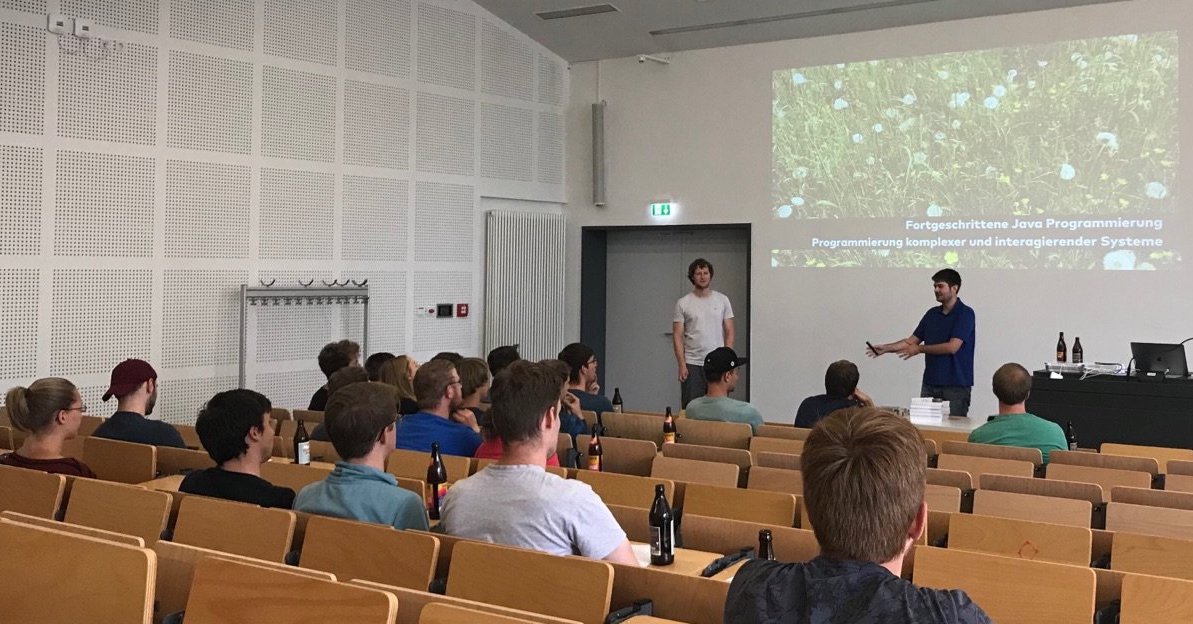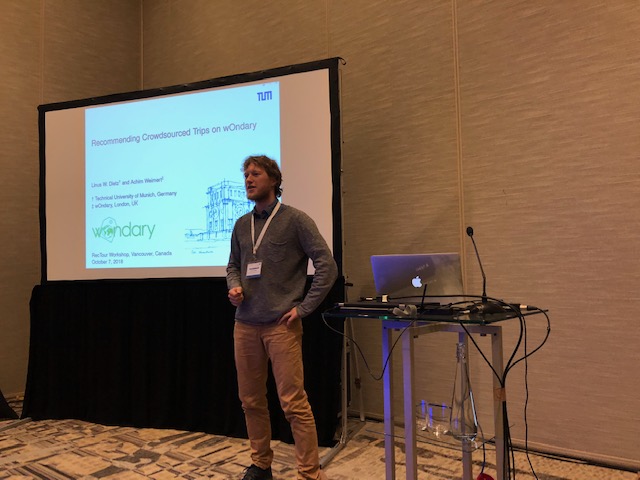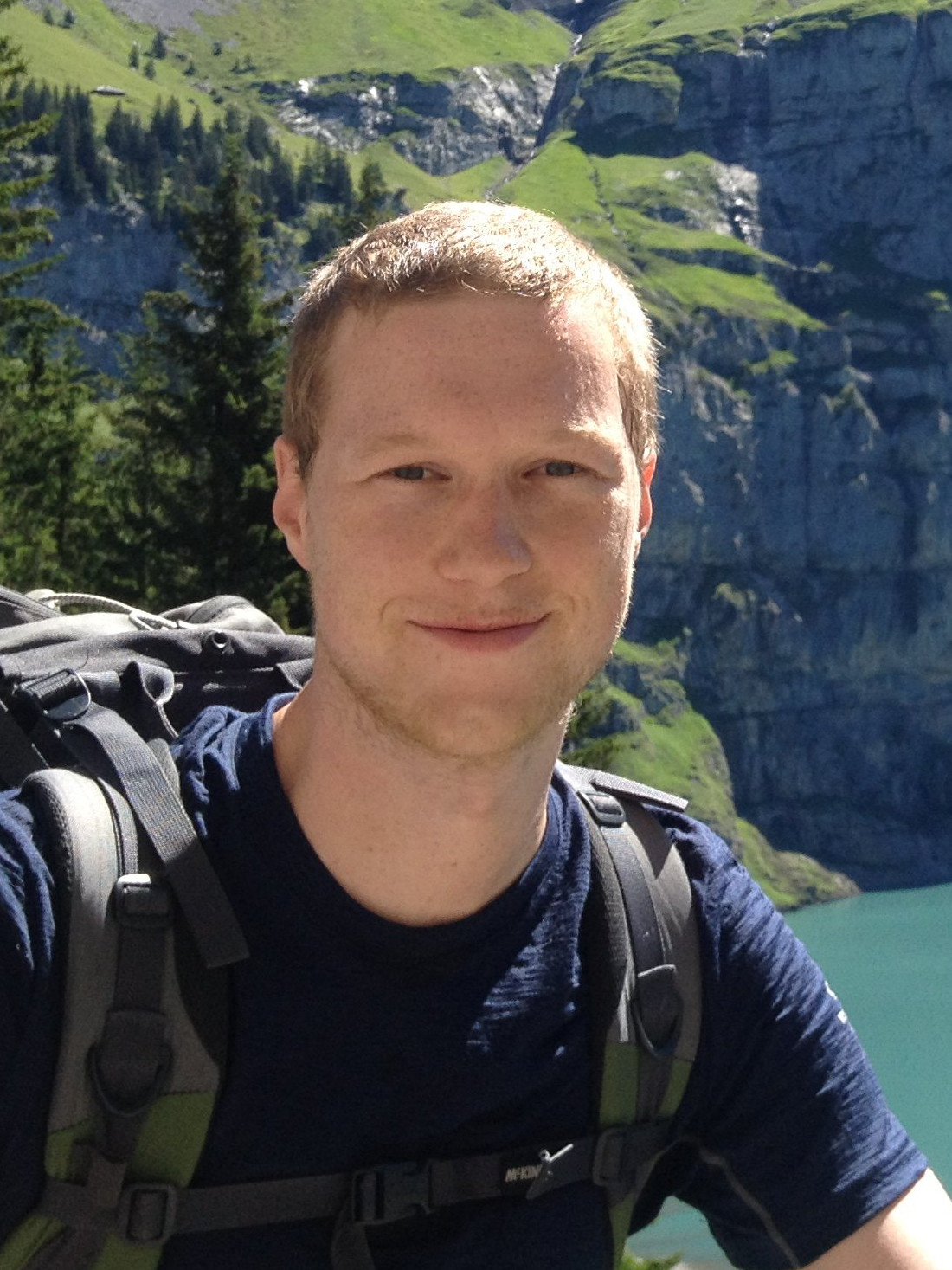Talks
Using Knowledge Bases to Improve LLM-based Feedback on Code Quality
EdTech Workshop
October 30, 2024 Imperial College London
Quantifying Urban Parks Based on their Potential for Health-promoting Activities
Data Natives London
April 05, 2024 City, University of London
As the world’s population continues to gravitate towards urban areas, cities are faced with the immense task of creating and maintaining green spaces to foster public health. Urban green spaces have become an increasingly vital element of urban health, reportedly enhancing various aspects of well-being, including physical, mental, and social health. With the prospect of further urbanization, the challenge of designing high-quality parks is set to intensify in the coming decades for city authorities and urban planners. We took this as cause to explore the exact link between activities in city parks and their health benefits. We examined the features of parks in 36 global cities with respect to their offerings for doing health-promoting activities. We theorized that parks with designated spaces and amenities would encourage specific activities and we could measure this using data analysis of crowdsourced online mapping data from OpenStreetMap. By connecting park amenities to activities they promote using large-language model annotation, and those activities to related health benefits using a literature survey, we scored parks on their potential for promoting health. We also highlighted the successes and shortcomings of providing high-quality parks to the populations in different cities.
Data-driven Destination Recommender Systems
Social Dynamics Seminar
February 02, 2023 Nokia Bell Labs, Cambridge, UK
I gave an overview of my research during my doctoral studies at the Social Dynamics Seminar.
Deciding where to travel is a complex, emotionally involving, and financially relevant decision which people face relatively infrequently. Some aspects of tourist recommendations, such as point-of-interest recommendation, hotel recommendations, or restaurant recommendations, are commercially well established, whereas there are few successful recommender systems for individual travel destinations. In this thesis, we present several contributions in the context of destination recommendation covering traveler mobility analysis, destination characterization, and conversational recommender systems.
Understanding traveler mobility forms the basis for more personalized recommendations. We propose methods to analyze global traveler mobility from location-based social networks to learn which data sources are suitable for analyses in this domain, how people travel around the world, and which types of travelers can be observed. Our cluster analyses of trips and travelers reveal distinct groups, which can serve as an initial preference elicitation step, but we could also show that the common practice of evaluating point-of-interest recommendations without differentiating these groups leads to misleading results. Furthermore, we use the mined trips to construct a specialized map of hierarchical travel regions and to recommend the personalized duration of stay at destinations.
To correctly match traveler preferences with destinations in the content-based recommendation domain, we investigate which data sources are suitable for characterizing destinations. Constructing 18 data models and eliciting the concept of touristic experience in cities using an expert study, we determine that textual data sources, e.g., Wikipedia articles, do a good job of emulating the touristic experience using rank agreement metrics. Additionally, we are able to optimize data sources with explicit features to be competitive by learning the importance of feature weights using black-box learning.
Finally, we present the CityRec conversational destination recommender system. Since users often struggle to verbalize their true preferences and might have unrealistic expectations about destinations, we propose a novel conversational paradigm, “Navigation by Revealing Trade-offs”, to overcome the wishful-thinking problem and inform users of the trade-offs involved in choosing one destination over another. The seamless integration of user interface and algorithms was evaluated using a large-scale user study with 600 participants.
Recommending the Duration of Stay in Personalized Travel Recommender Systems
ACM RecSys Workshop on Recommenders in Tourism
September 22, 2022 Seattle, WA, USA
Download Slides
The main focus of recommender systems research has been recommending fitting items to the users. However, in some domains, not only which item but also the quantity the target user should consume could be part of the recommendation. In this work, we tackle the under-researched problem of recommending the duration of stay in the domain of destination recommendation. Using two data sets, one based on hotel bookings and the other on mobility derived from geotagged Tweets, we perform extensive feature engineering with unsupervised learning to discover types of users and graph embeddings of the cities. In our experiments, we compare the performance of supervised learning algorithms with varying features to statistical baselines for predicting the duration of stay at a destination. The results underline the task’s difficulty: we obtain the best results for the hotel bookings data set using personalized mobility embeddings with CatBoost. At the same time, the simple strategy of recommending the mode duration of all users is competitive in the noisy Twitter data set.
Java by Comparison - Die Geschichte(n) des Buches
Softwerkskammer Köln
October 23, 2019 REWE Digital
Download Slides
Auf Basis von über 6 Jahren Java Lehre an der Uni Bamberg und dem Korrigieren von unzähligen Java-Aufgaben haben wir - Jörg Lenhard, Linus Dietz und Simon Harrer - ein Buch geschrieben, welches die typischen Fehler in einer innovativen Vorher/Nachher-Darstellung aufzeigt und erklärt: Java by Comparison. Durch diese Vergleiche können Einsteigerinnen und Einsteiger schneller eine Intuition für “Clean Code” entwickeln, Profis hilft es, ihre Denkweisen Einsteigern besser zu erklären und vielleicht das eine oder andere aufzufrischen. Wir stellen erst die Geschichte des Buches vor und gehen dann konkret auf ein paar der Vergleiche aus dem Buch ein. Danach wollen wir gemeinsam kreativ sein und mit euch ein von uns entwickeltes Spiel namens “Comparison Jeopardy” spielen.
Java by Comparison - Die Geschichte(n) des Buches
Softwerkskammer Nürnberg
October 10, 2019 Coworking Space Nürnberg
Auf Basis von über 6 Jahren Java Lehre an der Uni Bamberg und dem Korrigieren von unzähligen Java-Aufgaben haben wir (Jörg Lenhard, Linus Dietz und Simon Harrer) ein Buch geschrieben, welches die typischen Fehler in einer innovativen Vorher/Nachher-Darstellung aufzeigt und erklärt: Java by Comparison. Durch diese Vergleiche können Einsteigerinnen und Einsteiger schneller eine Intuition für “Clean Code” entwickeln, Profis hilft es ihre Denkweisen Einsteigern besser zu erklären und vielleicht das eine oder andere aufzufrischen. Wir stellen erst die Geschichte des Buches vor und gehen dann konkret auf ein paar der Vergleiche aus dem Buch ein. Danach wollen wir gemeinsam kreativ sein und mit euch ein von uns entwickeltes Spiel namens “Comparison Jeopardy” spielen. Wir freuen uns auf euch.
Java by Comparison - Die Geschichte(n) des Buches
Lightweight Java User Group München
October 09, 2019 Holidu GmbH, Munich
Auf Basis von über 6 Jahren Java Lehre an der Uni Bamberg und dem Korrigieren von unzähligen Java-Aufgaben haben wir (Jörg Lenhard, Linus Dietz und Simon Harrer) ein Buch geschrieben, welches die typischen Fehler in einer innovativen Vorher/Nachher-Darstellung aufzeigt und erklärt: Java by Comparison. Durch diese Vergleiche können Einsteigerinnen und Einsteiger schneller eine Intuition für “Clean Code” entwickeln, Profis hilft es ihre Denkweisen Einsteigern besser zu erklären und vielleicht das eine oder andere aufzufrischen. Wir stellen erst die Geschichte des Buches vor und gehen dann konkret auf ein paar der Vergleiche aus dem Buch ein. Danach wollen wir gemeinsam kreativ sein und mit euch ein von uns entwickeltes Spiel namens “Comparison Jeopardy” spielen. Wir freuen uns auf euch.
Designing a Conversational Travel Recommender System Based on Data-Driven Destination Characterization
ACM RecSys Workshop on Recommenders in Tourism
September 19, 2019 Copenhagen, Denmark
Download Slides
Recommending complex, intangible items in a domain with high consequences, such as destinations for traveling, requires additional care when deriving and confronting the users with recommendations. In order to address these challenges, we developed CityRec, a destination recommender that makes two contributions. The first is a data-driven approach to characterize cities according to the availability of venues and travel-related features, such as the climate and costs of travel. The second is a conversational recommender system with 180 destinations around the globe based on the data-driven characterization, which provides prospective travelers with inspiration for and information about their next trip. An online user study with 104 participants revealed that the proposed system has a significantly higher perceived accuracy compared to the baseline approach, however, at the cost of ease of use.
Full paper available as open access on CEUR-WS.
Java by Comparison - Die Geschichte(n) des Buches

Advanced Java Programming Course
July 08, 2019 University of Bamberg, Germany
Auf Basis von über 6 Jahren Java Lehre an der Uni Bamberg und dem Korrigieren von unzähligen Java-Aufgaben haben wir (Jörg Lenhard, Linus Dietz und Simon Harrer) ein Buch geschrieben, welches die typischen Fehler in einer innovativen Vorher/Nachher-Darstellung aufzeigt und erklärt: Java by Comparison. Durch diese Vergleiche können Einsteigerinnen und Einsteiger schneller eine Intuition für “Clean Code” entwickeln, Profis hilft es ihre Denkweisen Einsteigern besser zu erklären und vielleicht das eine oder andere aufzufrischen. Wir stellen erst die Geschichte des Buches vor und gehen dann konkret auf ein paar der Vergleiche aus dem Buch ein. Danach wollen wir gemeinsam kreativ sein und mit euch ein von uns entwickeltes Spiel namens “Comparison Jeopardy” spielen. Wir freuen uns auf euch.
Java by Comparison - Die Geschichte(n) des Buches
Softwerkskammer Leipzig
June 04, 2019 TomTom Telematics Leipzig
Auf Basis von über 6 Jahren Java Lehre an der Uni Bamberg und dem Korrigieren von unzähligen Java-Aufgaben haben wir (Jörg Lenhard, Linus Dietz und Simon Harrer) ein Buch geschrieben, welches die typischen Fehler in einer innovativen Vorher/Nachher-Darstellung aufzeigt und erklärt: Java by Comparison. Durch diese Vergleiche können Einsteigerinnen und Einsteiger schneller eine Intuition für “Clean Code” entwickeln, Profis hilft es ihre Denkweisen Einsteigern besser zu erklären und vielleicht das eine oder andere aufzufrischen. Wir stellen erst die Geschichte des Buches vor und gehen dann konkret auf ein paar der Vergleiche aus dem Buch ein. Danach wollen wir gemeinsam kreativ sein und mit euch ein von uns entwickeltes Spiel namens “Comparison Jeopardy” spielen. Wir freuen uns auf euch.
Half-day Clean Code Workshop at BMW Coding Dojo
BMW Coding Dojo
March 25, 2019 ITZ, Munich, Germany
Simon Harrer and me visited the Coding Dojo of the BMW Group IT and gave a half-day workshop on clean code: We gave a talk about our book, Java by Comparison, played a nice round of Comparison Jeopardy, and solved the Java by Comparison kata.
Incidentially, the BMW’s Careers Team covered this Dojo and made a short video of the talk and the kata.
Characterisation of Traveller Types Using Check-in Data from Location-Based Social Networks
ENTER 2019 eTourism Conference
January 30, 2019 Nicosia, Cyprus
Characterising types of travellers can serve as a foundation for tourism recommender systems. This paper presents an approach to identify traveller types by analysing check-in data from location-based social networks. 33 million Foursquare check-ins from 266,909 users are segmented into 23,340 foreign trips based on traveller mobility patterns. Hierarchical clustering was then applied to identify distinct groups of trips by features such as travel duration, number of countries visited, radius of gyration, and the distance from home. The results revealed four clusters of trips, which manifest a novel grouping of people’s travel behaviour.
Full paper available at Springer.
Recommending Crowdsourced Trips on wOndary

ACM RecSys Workshop on Recommenders in Tourism
October 07, 2018 Vancouver, BC, Canada
Download Slides
Making recommendations for tourist trips is a challenging task due to the intrinsic complexity of the domain. The characterization of itineraries is non-trivial, because there is a lack of open destination databases such as regions, islands, cities or attractions that would help to understand the characteristics of destinations within a trip. For this purpose, we present wOndary, which supports the planning and sharing of worldwide trips based on crowdsourcing. We sidestep item discovery and routing challenges of the tourist trip design problem by performing content-based recommendation by facilitating a novel structured representation of itineraries. We share our experiences in the establishment of the core model for our travel recommender system and discuss future developments.
Full paper available on CEUR-WS.
Affective Computing and Bandits: Capturing Context in Cold Start Situations
ACM RecSys 5th Joint Workshop on Interfaces and Human Decision Making for Recommender Systems
October 07, 2018 Vancouver, BC, Canada
Download Slides
The cold start problem describes the initial phase of a collaborative recommender where the quality of recommendation is low due to an insufficient number of ratings. Overcoming this is crucial because the system’s adoption will be impeded by low recommendation quality. In this paper, we propose capturing context via computer vision to improve recommender systems in the cold start phase. Computer vision algorithms can derive stereotypes such as gender or age, but also the user’s emotions without explicit interaction. We present an approach based on the statistical framework of bandit algorithms to incorporate stereotypic information and affective reactions into the recommendation. In a preliminary evaluation in a lab study with 21 participants, we already observe an improvement of the number of positive ratings. Furthermore, we report additional findings of experimenting with affective computing for recommender systems.
Full paper available on CEUR-WS.
Data-Driven Destination Recommender Systems
26th ACM User Modeling, Adaptation, and Personalization Conference (UMAP '2018)
July 10, 2018 Singapore, Singapore
Download Slides
Given vast number of possible global travel destinations, choosing a destination has become challenging. We argue that traditional media are insufficient to make informed travel decisions, due to a lack of objectivity, a lack of comparability and because information becomes out of date quickly. Thus, travel planning is an interesting field for data-driven recommender systems that support users to master information explosion. We present unresolved research questions with working packages for a doctoral project that combines the fields of recommender systems and user modeling with data mining. The core contributions will be a framework that integrates heterogeneous data sources from the travel domain, novel user modeling techniques and constraint-based recommender algorithms to master the complexities of global travel planning.
Java by Comparison - Die Geschichte(n) des Buches (German)
Hackerkegeln der DATEV SCC
May 15, 2018 Nürnberg, Germany
Auf Basis von über 6 Jahren Java Lehre an der Uni Bamberg und dem korrigieren von unzähligen Java-Aufgaben haben wir (Jörg Lenhard, Linus Dietz und Simon Harrer) ein Buch geschrieben, welches die typischen Fehler in einer innovativen Vorher/Nachher-Darstellung aufzeigt und erklärt: Java by Comparison.
Durch diese Vergleiche können Einsteigerinnen und Einsteiger schneller eine Intuition für “Clean Code” entwickeln, Profis hilft es ihre Denkweisen Einsteigern besser zu erklären und vielleicht das eine oder andere aufzufrischen. Wir stellen erst die Geschichte des Buches vor und gehen dann konkret auf ein paar der Vergleiche aus dem Buch ein. Danach wollen wir gemeinsam kreativ sein und mit euch ein Spiel namens “Java by Comparison Jeopardy” ausprobieren. Wir freuen uns auf euch.
Teaching Clean Code
1st Workshop on Innovative Software Engineering Education
March 06, 2018 Ulm, Germany
Download Slides
Learning programming is hard — teaching it well is even more challenging. At university, the focus is often on functional correctness and neglects the topic of clean and maintainable code, despite the dire need for developers with this skill set within the software industry. We present a feedback-driven teaching concept for college students in their second to third year that we have applied and refined successfully over a period of more than six years and for which received the faculty’s teaching award.
Evaluating the learning process within a semester of student submissions (n=18) with static code analysis tools shows satisfying progress. Identifying the correction of the in-semester programming assignments as the bottleneck for scaling the number of students in the course, we propose using a knowledge base of code examples to decrease the time to feedback and increase feedback quality. From our experience in assessing student code, we have compiled such a knowledge base with the typical issues of Java learners’ code in the format of before/after comparisons. By simply referencing the problem to the student, the quality of feedback can be improved, since such comparisons let the student understand the problem and the rationale behind the solution. Further speed-up is achieved by using a curated list of static code analysis checks to help the corrector in identifying violations in the code swiftly.
We see this work as a foundational step towards online courses with hundreds of students learning how to write clean code.
Deriving Tourist Mobility Patterns from Check-in Data
WSDM 2018 Workshop on Learning from User Interactions
February 09, 2018 Los Angeles, CA, USA
Download Slides
Recommendations in complex scenarios require additional knowledge of the domain. Planning a composite travel spanning several countries is a challenging, but encouraging domain for recommender systems, since users are in dire need for assistance: Information in typical publications, such as printed travel guides or personal blogs is often imprecise, biased or outdated.
In this paper we motivate a data-mining approach to improve destination recommender systems with learned travel patterns. Specifically, we propose a methodology to mine trips from location-based social networks to improve recommendations for the duration of stay at a destination. For this we propose a model for combining data from different sources and identify several metrics that are useful to ensure sufficient data quality, i.e., whether a traveler’s check-in behavior is adequate to derive patterns from it.
We demonstrate the utility of our approach using a Foursquare data set from which we extract 23,418 trips in 77 countries. Analyzing these trips, we determine the travel durations per country, how many countries are typically visited in a given time span and which countries are often visited together in a composite trip.
Also, we discuss how this method can be generalized to other recommender systems domains.
